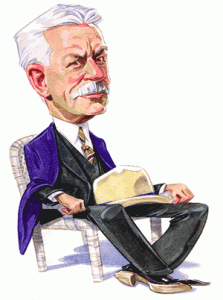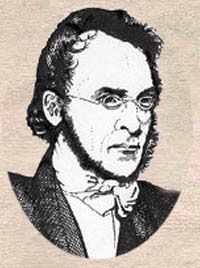Thursday

Nockian Corner
I mentioned last week that I was in the process of comparing the political theories of Orestes Brownson and Albert Jay Nock. Someone could, with disturbing insight, ask, "Why bother?"
My answer is simple: I'm smitten with Nock, but I'm more smitten with the Catholic Church. I would like to square Nockian political philosophy with Catholic political philosophy, without turning my endeavor into a game of Twister. Among all American political philosophers, Orestes Brownson may have been the greatest. And he was a fervent Catholic convert. If the Nockian and Brownsonian thought patterns overlap, I'd be onto something.
I think I ran across a starting point last weekend. Brownson distinguished among three types of democracy: (1) territorial democracy; (2) Jeffersonian democracy; (3) humanitarian democracy. He strongly endorsed territorial democracy and said it was, beyond doubt, the form of democracy on which the American Republic was built. He disliked Jeffersonian democracy (which emphasizes individualism and states' rights to the undue detriment of the central authority) and humanitarian democracy (which is a vague type of feel-goodism crusade to better humanity, without regard to territorial and other demographic limitations).

Now, I'm reasonably certain that Nock was a fan of Jeffersonian democracy. Although I haven't read his (supposedly) splendid biography of Jefferson, I've read enough by and about Nock to think he (i) would have agreed with Brownson's characterization of Jeffersonian democracy, and (ii) would be a fan of Jeffersonian democracy. Brownson, on the other hand, was no fan of it.
Yet they have a great common enemy: humanitarian democracy. And this is the form of democracy that ran roughshod over the political scene ever since the Civil War: from Reconstruction, to the Progressive movement, to Woodrow Wilson's Federal Reserve and income tax, to the New Deal, to the Great Society, to Obamacare. Both Brownson and Nock, I'm reasonably certain, would have hated most everything about the development of American political philosophy over the past 150 years.
So although I think they would each have different ultimate objectives and visions of the societal good (Brownson favoring territorial democracy and Nock favoring Jeffersonian democracy), their humongous common enemy (humanitarian democracy and the resulting behemoth State it has erected) makes Nock and Brownson far more allies than enemies and, because their common enemy has been so successful, the overlap between their political philosophies greatly dwarfs their differences at this point.
That, anyway, is where I am now.
